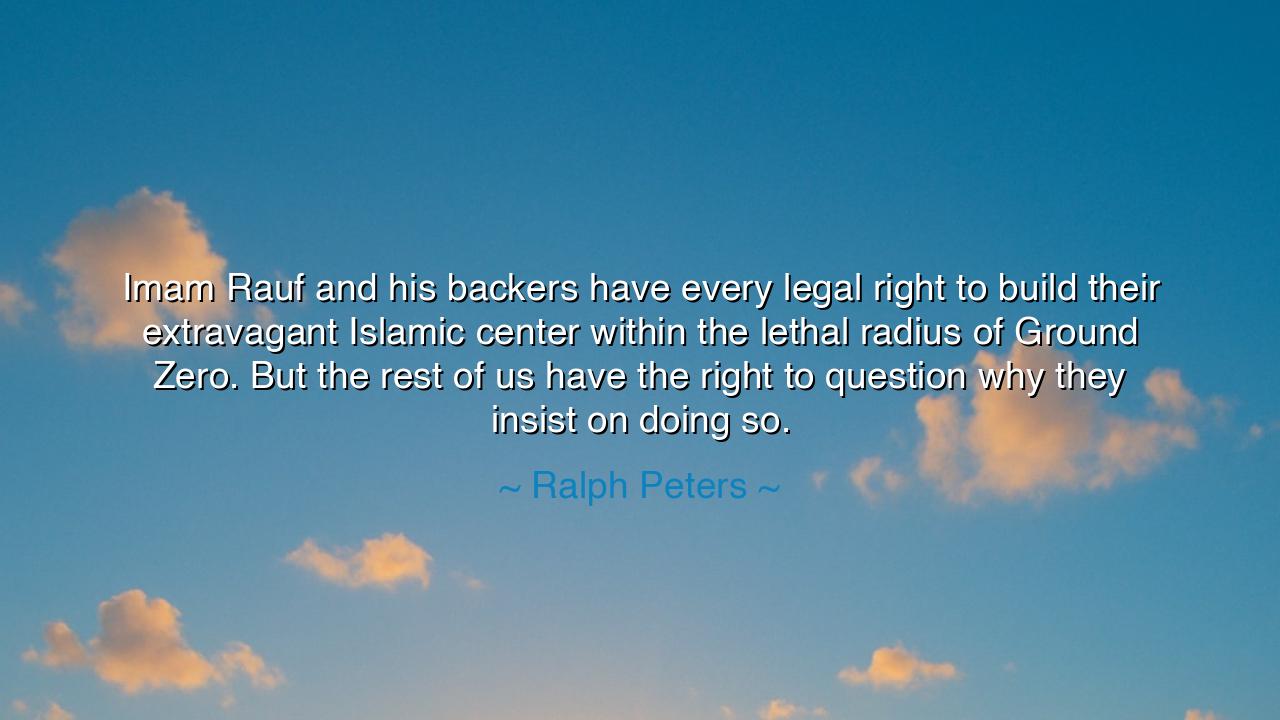
Imam Rauf and his backers have every legal right to build their
Imam Rauf and his backers have every legal right to build their extravagant Islamic center within the lethal radius of Ground Zero. But the rest of us have the right to question why they insist on doing so.






When Ralph Peters declared, “Imam Rauf and his backers have every legal right to build their extravagant Islamic center within the lethal radius of Ground Zero. But the rest of us have the right to question why they insist on doing so,” he was not merely speaking of law and buildings, but of memory, pain, and the fragile balance between liberty and reverence. His words emerged in the aftermath of one of the darkest days in modern history — the September 11 attacks — when wounds were still raw and hearts still aflame. In that hour, his statement became a reflection of the ancient struggle between rights and wisdom, between what one may do and what one ought to do.
The origin of this quote lies in the great debate over the proposed Islamic cultural center near Ground Zero in New York City — a project intended by its creators to promote peace and understanding, yet viewed by many as an act of insensitivity or even provocation. Peters acknowledges that legally, the right to build was unquestionable; the Constitution itself protects the freedom of faith. Yet his focus is moral and emotional, not legal. He speaks to the deeper question of propriety and empathy, of whether the exercise of a right can still wound the collective soul of a grieving people. In this tension, he reveals the eternal difference between justice by law and justice by conscience.
To the ancients, such a dilemma was familiar. When Antigone buried her brother against the king’s decree, she obeyed not the law of men but the law of the heart. Likewise, Peters reminds us that civilization is not sustained by law alone, but by respect for the sacred and the wounded. Freedom, if used without mindfulness, can reopen the very wounds it claims to heal. The wise know that true liberty is not the power to do all things, but the discernment to do the right thing — the act that restores harmony rather than deepens division. Thus, Peters’ words echo an ancient moral: that freedom must be tempered by reverence.
His tone also reveals the voice of a soldier — a man who has seen the cost of war and the fragility of peace. To him, Ground Zero is not merely a place, but a tomb of heroes and innocents, a scar on the heart of a nation. To raise any monument upon that soil, however noble in intent, demands a humility equal to the pain that still lingers there. Peters’s warning is not born of hatred, but of memory — of the sacred duty to guard the sanctity of loss. He calls upon the living to remember that not all rights are meant to be exercised without reflection, for some spaces in history must remain silent altars of remembrance.
In the story of nations, there have always been moments when freedom and feeling collide. When the Athenian playwrights mocked their gods in public festivals, it was both liberty and sacrilege — and the people wrestled with where reverence ends and expression begins. When the builders of cathedrals placed crosses on the ruins of pagan temples, they too believed they were healing history, yet others saw it as conquest. Peters’s words, in the modern age, call us to face the same question: How do we honor both liberty and loss without diminishing either? This is not a legal riddle, but a spiritual one — a question for the conscience, not the courtroom.
His statement also reflects a deeper truth about the nature of human coexistence. To question does not mean to condemn; to disagree does not mean to hate. Peters urges the right of a nation to grapple aloud with its grief, to ask why certain choices are made in the shadow of sorrow. In doing so, he defends the very freedom of thought that allows a society to heal. His words remind us that democracy is not silence, but dialogue — and that even when emotions are fierce, the act of questioning can be a form of mourning, and a plea for understanding.
And so, the lesson that endures from this quote is this: Freedom is sacred, but so is empathy. One without the other leads to ruin. To exercise rights without wisdom is to turn liberty into arrogance; to demand silence in the name of sensitivity is to turn grief into tyranny. The path of the wise lies between these extremes — to act freely, yet with reverence; to speak boldly, yet with compassion; to build, but never upon the hearts of the broken. For in the harmony between freedom and respect lies the true strength of a people — a strength that neither tragedy nor time can ever destroy.






AAdministratorAdministrator
Welcome, honored guests. Please leave a comment, we will respond soon